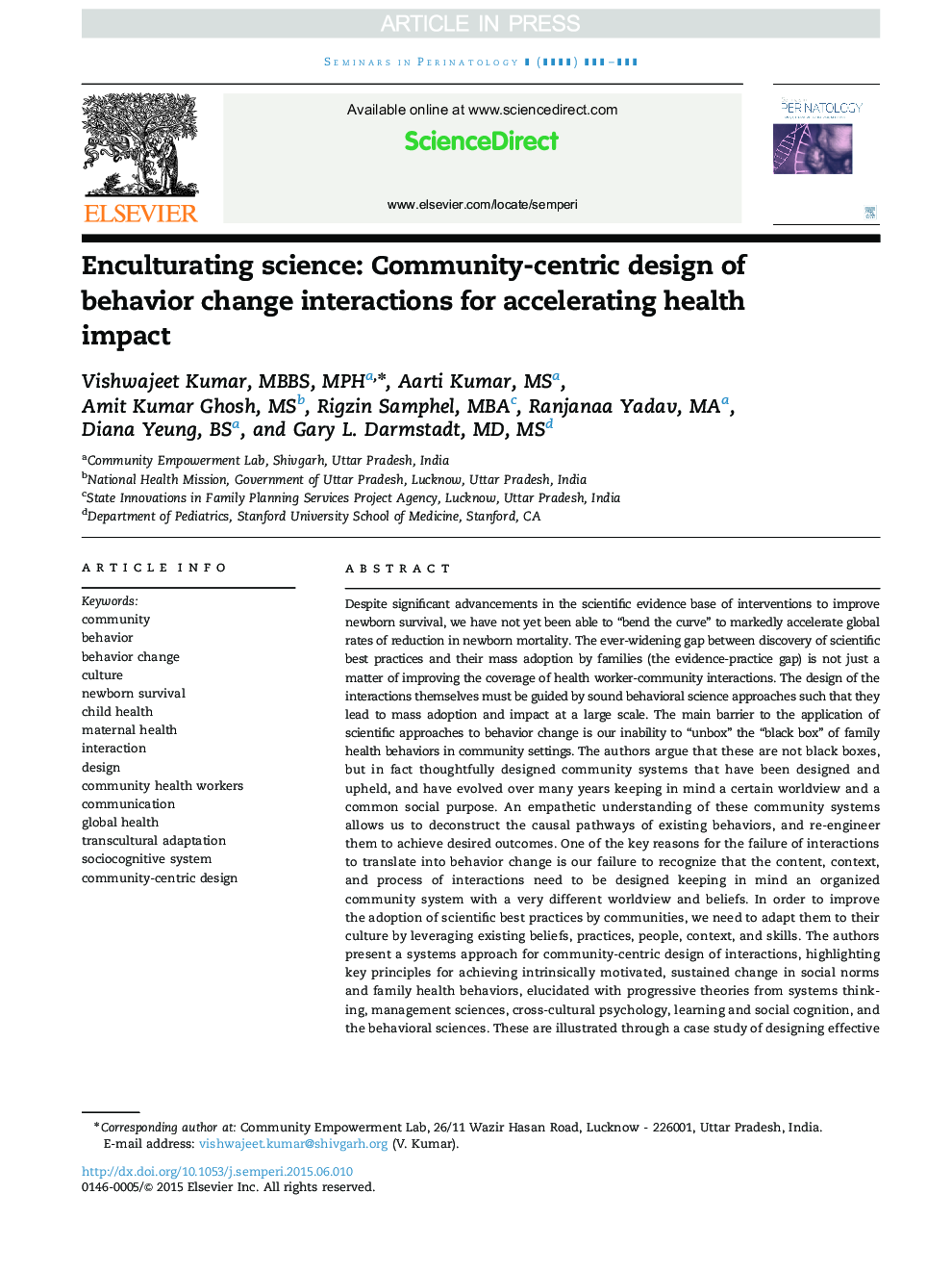| کد مقاله | کد نشریه | سال انتشار | مقاله انگلیسی | نسخه تمام متن |
|---|---|---|---|---|
| 6155790 | 1247530 | 2015 | 23 صفحه PDF | دانلود رایگان |
عنوان انگلیسی مقاله ISI
Enculturating science: Community-centric design of behavior change interactions for accelerating health impact
ترجمه فارسی عنوان
دانش محرمانه: طراحی محاوره ای متمرکز بر تعاملات رفتاری برای تسریع تاثیر سلامت
دانلود مقاله + سفارش ترجمه
دانلود مقاله ISI انگلیسی
رایگان برای ایرانیان
کلمات کلیدی
جامعه رفتار - اخلاق، تغییر رفتار، فرهنگ، بقای نوزادان، سلامت کودک، سلامت مادری، اثر متقابل، طرح، کارکنان بهداشت محلی، ارتباطات، سلامت جهانی، سازگاری فرهنگی، سیستم اجتماعی شناختی، طراحی محله مرکزی،
Interaction - اثر متقابلCommunity - اجتماعCommunication - ارتباطاتNewborn survival - بقای نوزادGlobal health - بهداشت جهانیBehavior change - تغییر رفتارBehavior - رفتارTranscultural adaptation - سازگاری فرهنگیMaternal health - سلامت مادریChild Health - سلامت کودکDesign - طراحیCulture - فرهنگ Community health workers - کارکنان بهداشت محلی
موضوعات مرتبط
علوم پزشکی و سلامت
پزشکی و دندانپزشکی
پزشکی و دندانپزشکی (عمومی)
چکیده انگلیسی
Despite significant advancements in the scientific evidence base of interventions to improve newborn survival, we have not yet been able to “bend the curve” to markedly accelerate global rates of reduction in newborn mortality. The ever-widening gap between discovery of scientific best practices and their mass adoption by families (the evidence-practice gap) is not just a matter of improving the coverage of health worker-community interactions. The design of the interactions themselves must be guided by sound behavioral science approaches such that they lead to mass adoption and impact at a large scale. The main barrier to the application of scientific approaches to behavior change is our inability to “unbox” the “black box” of family health behaviors in community settings. The authors argue that these are not black boxes, but in fact thoughtfully designed community systems that have been designed and upheld, and have evolved over many years keeping in mind a certain worldview and a common social purpose. An empathetic understanding of these community systems allows us to deconstruct the causal pathways of existing behaviors, and re-engineer them to achieve desired outcomes. One of the key reasons for the failure of interactions to translate into behavior change is our failure to recognize that the content, context, and process of interactions need to be designed keeping in mind an organized community system with a very different worldview and beliefs. In order to improve the adoption of scientific best practices by communities, we need to adapt them to their culture by leveraging existing beliefs, practices, people, context, and skills. The authors present a systems approach for community-centric design of interactions, highlighting key principles for achieving intrinsically motivated, sustained change in social norms and family health behaviors, elucidated with progressive theories from systems thinking, management sciences, cross-cultural psychology, learning and social cognition, and the behavioral sciences. These are illustrated through a case study of designing effective interactions in Shivgarh, India, that led to rapid and substantial changes in newborn health behaviors and reduction in NMR by half over a span of 16 months.
ناشر
Database: Elsevier - ScienceDirect (ساینس دایرکت)
Journal: Seminars in Perinatology - Volume 39, Issue 5, August 2015, Pages 393-415
Journal: Seminars in Perinatology - Volume 39, Issue 5, August 2015, Pages 393-415
نویسندگان
Vishwajeet MBBS, MPH, Aarti MS, Amit Kumar MS, Rigzin MBA, Ranjanaa MA, Diana BS, Gary L. MD, MS,
